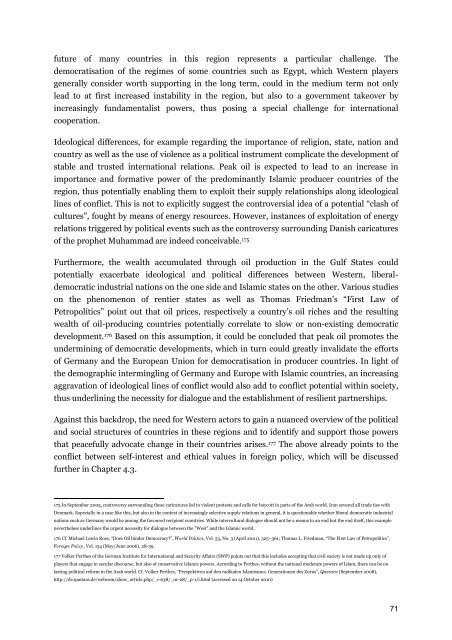PEAK OIL
PEAK OIL
PEAK OIL
You also want an ePaper? Increase the reach of your titles
YUMPU automatically turns print PDFs into web optimized ePapers that Google loves.
future of many countries in this region represents a particular challenge. The<br />
democratisation of the regimes of some countries such as Egypt, which Western players<br />
generally consider worth supporting in the long term, could in the medium term not only<br />
lead to at first increased instability in the region, but also to a government takeover by<br />
increasingly fundamentalist powers, thus posing a special challenge for international<br />
cooperation.<br />
Ideological differences, for example regarding the importance of religion, state, nation and<br />
country as well as the use of violence as a political instrument complicate the development of<br />
stable and trusted international relations. Peak oil is expected to lead to an increase in<br />
importance and formative power of the predominantly Islamic producer countries of the<br />
region, thus potentially enabling them to exploit their supply relationships along ideological<br />
lines of conflict. This is not to explicitly suggest the controversial idea of a potential “clash of<br />
cultures”, fought by means of energy resources. However, instances of exploitation of energy<br />
relations triggered by political events such as the controversy surrounding Danish caricatures<br />
of the prophet Muhammad are indeed conceivable. 175<br />
Furthermore, the wealth accumulated through oil production in the Gulf States could<br />
potentially exacerbate ideological and political differences between Western, liberaldemocratic<br />
industrial nations on the one side and Islamic states on the other. Various studies<br />
on the phenomenon of rentier states as well as Thomas Friedman’s “First Law of<br />
Petropolitics” point out that oil prices, respectively a country’s oil riches and the resulting<br />
wealth of oil-producing countries potentially correlate to slow or non-existing democratic<br />
development. 176 Based on this assumption, it could be concluded that peak oil promotes the<br />
undermining of democratic developments, which in turn could greatly invalidate the efforts<br />
of Germany and the European Union for democratisation in producer countries. In light of<br />
the demographic intermingling of Germany and Europe with Islamic countries, an increasing<br />
aggravation of ideological lines of conflict would also add to conflict potential within society,<br />
thus underlining the necessity for dialogue and the establishment of resilient partnerships.<br />
Against this backdrop, the need for Western actors to gain a nuanced overview of the political<br />
and social structures of countries in these regions and to identify and support those powers<br />
that peacefully advocate change in their countries arises. 177 The above already points to the<br />
conflict between self-interest and ethical values in foreign policy, which will be discussed<br />
further in Chapter 4.3.<br />
175 In September 2005, controversy surrounding these caricatures led to violent protests and calls for boycott in parts of the Arab world. Iran severed all trade ties with<br />
Denmark. Especially in a case like this, but also in the context of increasingly selective supply relations in general, it is questionable whether liberal democratic industrial<br />
nations such as Germany would be among the favoured recipient countries. While intercultural dialogue should not be a means to an end but the end itself, this example<br />
nevertheless underlines the urgent necessity for dialogue between the "West" and the Islamic world.<br />
176 Cf. Michael Lewin Ross, “Does Oil hinder Democracy?”, World Politics, Vol. 53, No. 3 (April 2001), 325–361; Thomas L. Friedman, “The First Law of Petropolitics”,<br />
Foreign Policy, Vol. 154 (May/June 2006), 28-39.<br />
177 Volker Perthes of the German Institute for International and Security Affairs (SWP) points out that this includes accepting that civil society is not made up only of<br />
players that engage in secular discourse, but also of conservative Islamic powers. According to Perthes, without the national moderate powers of Islam, there can be no<br />
lasting political reform in the Arab world. Cf. Volker Perthes, “Perspektiven auf den radikalen Islamismus. Generationen des Zorns”, Qantara (September 2008),<br />
http://de.qantara.de/webcom/show_article.php/_c-638/_nr-28/_p-1/i.html (accessed on 14 October 2010)<br />
71


